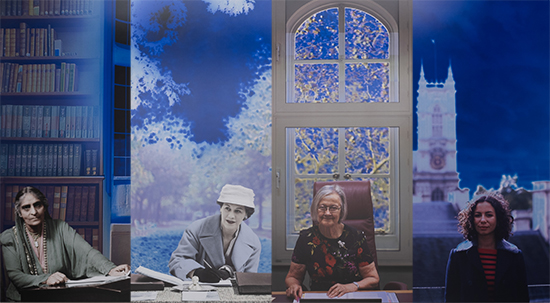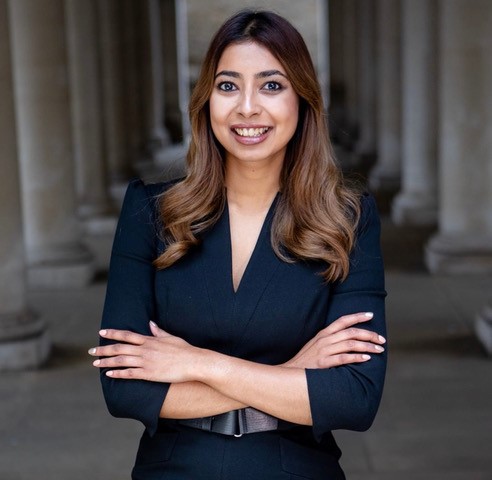*/

What is the everyday experience of being a junior female barrister, and why do women leave the Bar? Choice or circumstance? asks Adiba Bassam
As I write this, in the week we mark International Women’s Day 2022, I am thinking about my everyday experience of being a woman. For me, being a junior, junior barrister at the Family Bar forms a great part of my everyday life and identity. I use two 'juniors' to depict my baby lawyer status and I am quite proud to call myself a South-Asian, female barrister which I do not take for granted for a second. I recognise the path that was cleared for me by the strong-willed women preceding me and standing beside me now.
When I joined the Bar as a pupil in 2019, it was exactly 100 years since the Sex Disqualification (Removal) Act 1919 was passed, allowing women to enter the legal profession. I joined women all over the country having our pictures taken by the First 100 Years Project. These photos showed just how far we’ve come in the last 100 years. Many women chose to be photographed with their children, showing that it was possible to be a mother and a barrister and a role model for others. Now, in 2022, it is 100 years since Ivy Williams became the first woman to be called to the Bar of England and Wales and Helena Normanton became the first woman to practise at the Bar. As a South-Asian woman, I am also happy to note that the first female practising Indian barrister, Cornelia Sorabji (pictured below, left) followed in 1923.
It is almost impossible for me to imagine that – had it been 100 years ago – I could not be practising as a female barrister and doing the job I love.

© Catherine Yass; Legacy 2019. Artwork reproduced with the permission of the artist and Spark 21/First 100 Years.*
While there are an equal number of female and male pupils at the entrance point to the Bar, the issue is retention and the proportion of QCs. According to the latest BSB report on Diversity at the Bar 2020, women constitute 38.2% of the Bar, so what happened to the 11.8%? What leads to women not staying at the Bar? Is it choice or circumstance?
My experience at the Bar has been one where there is recognition of the fact that women, especially in some fields, are still plighted with disadvantage. While I choose to practise family law, some reactions to my choice have been that it 'makes sense' as the Family Bar is ‘most suitable’ for women. It seems that women are guided to legally aided work, and that work is not well remunerated.
Another problematic practice I have noticed is running hearings past 4:30/5pm. In my experience, this has happened without asking whether anyone has difficulties continuing on. No doubt my contemporaries at the Criminal Bar are well aware of this issue, with extended court hours being raised for courts to sit until 6pm and even on weekends. I can say with certainty that any barrister reading this, whether male or female, already works unsocial hours, beyond the 9-5, beyond the working week. This already involves making sacrifices. In my time at the Bar, I have taken work with me on annual leave, I have cancelled plans, and I have looked at my emails more than I care to admit when spending time with my family. I have taken cases on prep-days, and I have paid the price of limited time for myself, no doubt taking a toll on my wellbeing.
It has crossed my mind that, if it’s like this now, how will I manage if I have children? It is frustrating that in 2022, it seems that striking a balance can be impossible at times due to the inflexibility of the job.
As a South-Asian barrister, my experience is not only formed by the fact that I am a woman. For me, it is also the fact I am an ethnic minority woman. Coming to the Bar, I was well aware that it was going to be more of an uphill battle for me. It is disheartening to read the statistics: 22.9% ethnic minority pupils as compared to the 67.2% white pupils, 8.8% ethnic minority QCs as compared to the 86.5% of white QCs.

Adiba Bassam is a family law barrister
I have highlighted a few issues above, but what are the answers? How do we make space at the Bar for women – all women, ethnic minority women, those with caring responsibilities, those who have disabilities?
Support each other. I cannot say this loud or strong enough. A woman can be a woman’s best ally. Share your experience, whether bad or good, with your contemporaries and those following in your footsteps. During the pandemic I joined the wonderful women of Themis, and it not only gave me insight to the need of intersectionality at the Bar, but it gave me allies. At the end of a hard day at court when I reach out to these ladies they are there, on trains during their long journeys from court, balancing life and work.
Find your allies. Reach out to the different organisations, whether this is specific to your area of practice such as Women in Family Law or Women in Criminal Law or the Inns of Court Alliance for Women, Women in the Law UK, Association of UK Women Judges etc.
Advocate for change, whether or not it affects you. I do not at present have childcare responsibilities, but when cases have been sitting long, I have raised that the advocates should be asked at this juncture whether they can continue on.
You may not be from an ethnic minority background but you can recognise the issues, and campaign and challenge when bias is shown. For me, my first name is often mispronounced. When a fellow advocate corrected another in an advocates’ meeting after I had already corrected it previously, it saved me the awkwardness of having to do so myself. That mistake did not happen again.
Ask for your space, and make space for the woman beside and behind you.
*Pictured above: Legal pioneers Cornelia Sorabji, Dame Rose Heilbron, Baroness Hale of Richmond DBE and an unnamed student are depicted in an art installation by the internationally recognised artist, Catherine Yass at the UK Supreme Court, commissioned by Spark 21, the charity which manages the First 100 Years campaign, to mark the centenary of the Sex Disqualification (Removal) Act 1919 and celebrate 100 years of women in law.

As I write this, in the week we mark International Women’s Day 2022, I am thinking about my everyday experience of being a woman. For me, being a junior, junior barrister at the Family Bar forms a great part of my everyday life and identity. I use two 'juniors' to depict my baby lawyer status and I am quite proud to call myself a South-Asian, female barrister which I do not take for granted for a second. I recognise the path that was cleared for me by the strong-willed women preceding me and standing beside me now.
When I joined the Bar as a pupil in 2019, it was exactly 100 years since the Sex Disqualification (Removal) Act 1919 was passed, allowing women to enter the legal profession. I joined women all over the country having our pictures taken by the First 100 Years Project. These photos showed just how far we’ve come in the last 100 years. Many women chose to be photographed with their children, showing that it was possible to be a mother and a barrister and a role model for others. Now, in 2022, it is 100 years since Ivy Williams became the first woman to be called to the Bar of England and Wales and Helena Normanton became the first woman to practise at the Bar. As a South-Asian woman, I am also happy to note that the first female practising Indian barrister, Cornelia Sorabji (pictured below, left) followed in 1923.
It is almost impossible for me to imagine that – had it been 100 years ago – I could not be practising as a female barrister and doing the job I love.

© Catherine Yass; Legacy 2019. Artwork reproduced with the permission of the artist and Spark 21/First 100 Years.*
While there are an equal number of female and male pupils at the entrance point to the Bar, the issue is retention and the proportion of QCs. According to the latest BSB report on Diversity at the Bar 2020, women constitute 38.2% of the Bar, so what happened to the 11.8%? What leads to women not staying at the Bar? Is it choice or circumstance?
My experience at the Bar has been one where there is recognition of the fact that women, especially in some fields, are still plighted with disadvantage. While I choose to practise family law, some reactions to my choice have been that it 'makes sense' as the Family Bar is ‘most suitable’ for women. It seems that women are guided to legally aided work, and that work is not well remunerated.
Another problematic practice I have noticed is running hearings past 4:30/5pm. In my experience, this has happened without asking whether anyone has difficulties continuing on. No doubt my contemporaries at the Criminal Bar are well aware of this issue, with extended court hours being raised for courts to sit until 6pm and even on weekends. I can say with certainty that any barrister reading this, whether male or female, already works unsocial hours, beyond the 9-5, beyond the working week. This already involves making sacrifices. In my time at the Bar, I have taken work with me on annual leave, I have cancelled plans, and I have looked at my emails more than I care to admit when spending time with my family. I have taken cases on prep-days, and I have paid the price of limited time for myself, no doubt taking a toll on my wellbeing.
It has crossed my mind that, if it’s like this now, how will I manage if I have children? It is frustrating that in 2022, it seems that striking a balance can be impossible at times due to the inflexibility of the job.
As a South-Asian barrister, my experience is not only formed by the fact that I am a woman. For me, it is also the fact I am an ethnic minority woman. Coming to the Bar, I was well aware that it was going to be more of an uphill battle for me. It is disheartening to read the statistics: 22.9% ethnic minority pupils as compared to the 67.2% white pupils, 8.8% ethnic minority QCs as compared to the 86.5% of white QCs.

Adiba Bassam is a family law barrister
I have highlighted a few issues above, but what are the answers? How do we make space at the Bar for women – all women, ethnic minority women, those with caring responsibilities, those who have disabilities?
Support each other. I cannot say this loud or strong enough. A woman can be a woman’s best ally. Share your experience, whether bad or good, with your contemporaries and those following in your footsteps. During the pandemic I joined the wonderful women of Themis, and it not only gave me insight to the need of intersectionality at the Bar, but it gave me allies. At the end of a hard day at court when I reach out to these ladies they are there, on trains during their long journeys from court, balancing life and work.
Find your allies. Reach out to the different organisations, whether this is specific to your area of practice such as Women in Family Law or Women in Criminal Law or the Inns of Court Alliance for Women, Women in the Law UK, Association of UK Women Judges etc.
Advocate for change, whether or not it affects you. I do not at present have childcare responsibilities, but when cases have been sitting long, I have raised that the advocates should be asked at this juncture whether they can continue on.
You may not be from an ethnic minority background but you can recognise the issues, and campaign and challenge when bias is shown. For me, my first name is often mispronounced. When a fellow advocate corrected another in an advocates’ meeting after I had already corrected it previously, it saved me the awkwardness of having to do so myself. That mistake did not happen again.
Ask for your space, and make space for the woman beside and behind you.
*Pictured above: Legal pioneers Cornelia Sorabji, Dame Rose Heilbron, Baroness Hale of Richmond DBE and an unnamed student are depicted in an art installation by the internationally recognised artist, Catherine Yass at the UK Supreme Court, commissioned by Spark 21, the charity which manages the First 100 Years campaign, to mark the centenary of the Sex Disqualification (Removal) Act 1919 and celebrate 100 years of women in law.
What is the everyday experience of being a junior female barrister, and why do women leave the Bar? Choice or circumstance? asks Adiba Bassam


The Bar Council is ready to support a turn to the efficiencies that will make a difference
By Louise Crush of Westgate Wealth Management
Marie Law, Director of Toxicology at AlphaBiolabs, examines the latest ONS data on drug misuse and its implications for toxicology testing in family law cases
An interview with Rob Wagg, CEO of New Park Court Chambers
What meaningful steps can you take in 2026 to advance your legal career? asks Thomas Cowan of St Pauls Chambers
Marie Law, Director of Toxicology at AlphaBiolabs, explains why drugs may appear in test results, despite the donor denying use of them
The appointments of 96 new King’s Counsel (also known as silk) are announced today
Ready for the new way to do tax returns? David Southern KC continues his series explaining the impact on barristers. In part 2, a worked example shows the specific practicalities of adapting to the new system
Resolution of the criminal justice crisis does not lie in reheating old ideas that have been roundly rejected before, say Ed Vickers KC, Faras Baloch and Katie Bacon
With pupillage application season under way, Laura Wright reflects on her route to ‘tech barrister’ and offers advice for those aiming at a career at the Bar
Jury-less trial proposals threaten fairness, legitimacy and democracy without ending the backlog, writes Professor Cheryl Thomas KC (Hon), the UK’s leading expert on juries, judges and courts